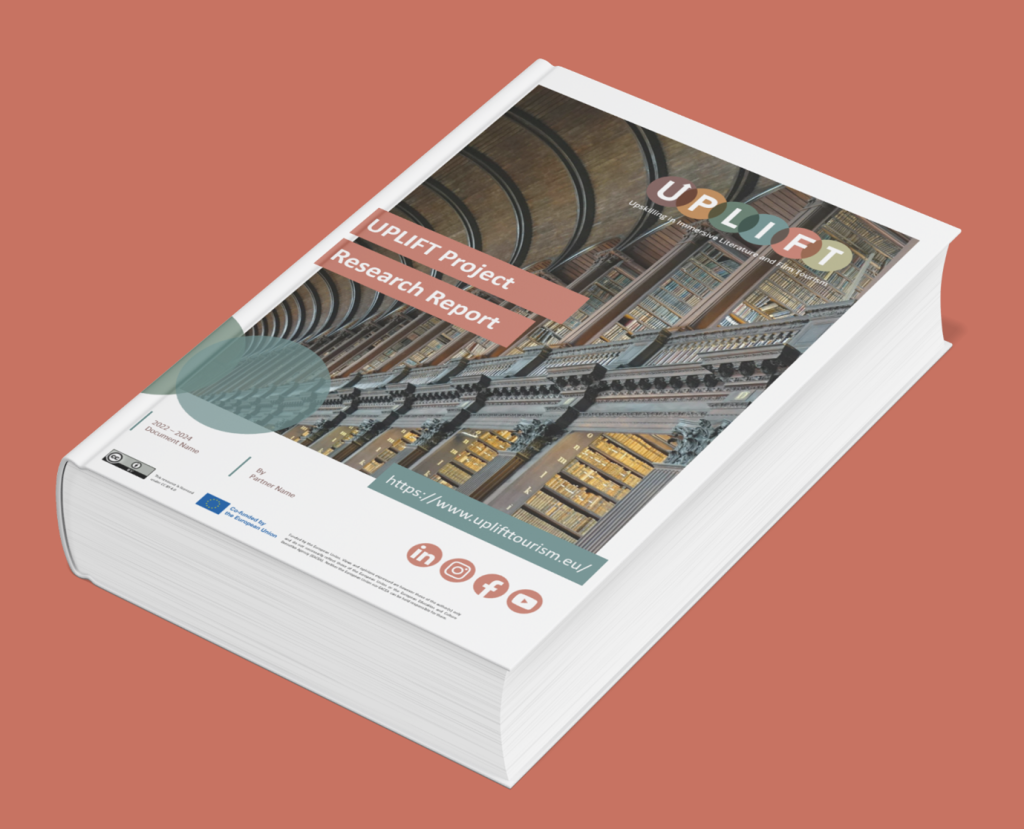
The UPLIFT project is delighted to announce the completion of its latest research report, Vocational Skills for Immersive Tourism in Europe, led by the Technological University of the Shannon (TUS). This comprehensive study explores the emerging role of Virtual Reality (VR), Augmented Reality (AR), and Artificial Intelligence (AI) in film and literary tourism while identifying the vocational skills needed to integrate these technologies into the industry.
The report is a key milestone in the UPLIFT project’s mission to align vocational education and training (VET) with the evolving demands of the European tourism sector. By combining desk research and interviews with industry experts, the study sheds light on best practices, skills gaps, and key trends shaping the future of immersive tourism. The findings will directly support at least 100 educators in adapting their teaching and training practices, equipping the next generation of tourism professionals with cutting-edge digital skills. As well as English, the report will also be available to view in Icelandic, Lithuanian, and Slovenian.
The Growing Potential of Immersive Tourism
As the demand for interactive and personalised travel experiences increases, immersive technologies offer a transformative opportunity for the tourism industry. From AR-enhanced literary tours to VR recreations of famous film locations, digital innovation is reshaping how visitors engage with destinations.
For Small and Medium-sized Enterprises (SMEs)—which form the backbone of Europe’s tourism sector—immersive technologies provide a cost-effective way to create engaging, year-round experiences. The challenge, however, lies in building the necessary skills to adopt these technologies.
A stakeholder interviewed for the study highlighted this need:
“In terms of technical implementation, we need someone who can create 3D models—so, modelers. Then we need programmers to code the project and technicians to determine which hardware and software to use. This is crucial because, for example, I might know how to model but not how to transfer that information to VR or LED screens for virtual production.”
This is where VET institutions and educators play a crucial role—by ensuring that future tourism professionals are equipped with digital storytelling, AR/VR design, and interactive tourism development skills.
Key Insights from the Report
The report presents a SWOT analysis outlining the strengths, weaknesses, opportunities, and threats that impact immersive film and literary tourism.
✅ Strengths
- Growing interest in immersive tourism among SMEs and tourism organisations.
- Access to EU funding and support programs for digital training.
- Strong storytelling and creative industry expertise in European tourism.
- Opportunities for collaborations with universities and tech companies.
❌ Weaknesses
- Limited technical expertise in AR/VR development among SMEs.
- High learning curve for immersive technologies.
- Budget constraints for training and implementation.
- Slow adoption among traditional tourism organisations.
💡 Opportunities
- Specialised training programmes for digital tourism skills.
- Partnerships with tech startups and universities to provide hands-on training.
- Expansion of online learning platforms to make training more accessible.
- Government support for digital upskilling in the tourism industry.
⚠️ Threats
- Fast-paced technological advancements requiring constant skill updates.
- High implementation costs for immersive experiences.
- Resistance to digital transformation from traditional tourism operators.
One interviewee from the study emphasised the importance of user-friendly technology, stating:
“Most people have cameras on their phones, so using QR codes to get this extra experience or to access more information does not hurt. And with new generations being more tech-savvy, digital enhancements are becoming a key part of tourism experiences.”
Future Trends in Immersive Film and Literary Tourism
The report also highlights key trends shaping the future of immersive tourism, including:
- Augmented Reality (AR) Enhancements – AR-based film and literary walking tours that overlay digital content onto real-world locations, such as Game of Thrones locations or historical author narrations.
- Virtual Reality (VR) Experiences – Immersive VR recreations of film and literary settings, allowing visitors to experience destinations remotely or during off-peak seasons.
- Gamification & Interactive Storytelling – AR-driven scavenger hunts and digital treasure hunts, linking visitors to literary and film history through interactive challenges.
- Live Performances & Holographic Projections – The use of holograms and virtual reenactments to bring historical authors, film scenes, and literary figures to life.
One stakeholder described the growing interest in VR applications but also noted the challenges:
“Yeah, we had looked at VR goggles back in the early days, but what we needed was numbers. The technology is great, but it needs to be widely accessible.”
This underlines the importance of affordable, scalable digital training, ensuring that SMEs and educators have the tools needed to keep pace with immersive tourism innovations.
What’s Next?
The insights from this research will directly inform the next phases of the UPLIFT project, including:
✔️ XR-focused workshops (Work Package 3) to integrate immersive tourism practices into VET curricula.
✔️ Webinars for SMEs and educators (Work Package 4) to provide hands-on training in VR/AR applications.
✔️ Development of online video lessons and engagement clinics, ensuring wider accessibility to training materials.
By addressing skills gaps, identifying industry trends, and providing actionable recommendations, this report is a crucial step in ensuring that European tourism professionals are future-ready.
📍 Facebook: UPLIFT EU
📍 Instagram: @uplifttourismeu
📍 LinkedIn: UPLIFT Tourism
📍 YouTube: UPLIFT EU
Stay connected and join us as we shape the future of immersive tourism in Europe!
Written by Kathryn O’Brien (EUEI)



